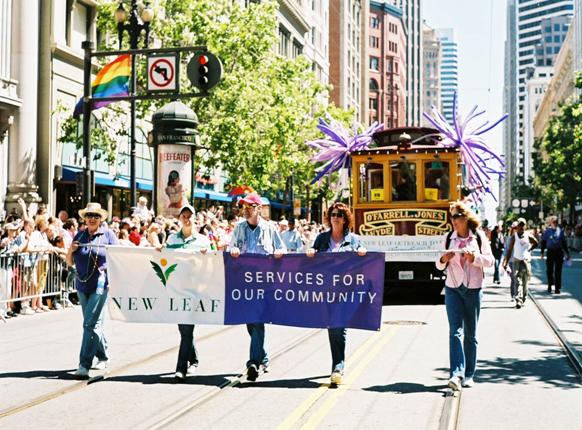Pride and Prejudice

New Leaf Seniors Gay Pride Cable Car
Every June in SF, and around the world, LBGT people and supporters celebrate Lesbian Bisexual Gay Transgender Pride month. This tradition began in 1969, after the Stonewall rebellion in New York City. After years of police harassment, LGBT people organized and fought back. Similar actions took place in San Francisco in 1966, during the Compton Café rebellion. These actions gave rise in the 70s to a militant Gay Liberation Front. Of course, LGBT people, like all oppressed people, had previously organized and challenged injustices. In the 50s Harry Hay with other progressives formed the Mattachine Society, and Del Martin & Phyllis Lyon established the DOB (Daughters of Bilitis. SIR (Society for Individual Rights) held picket lines outside the White House. These were brave actions taken at the height of the McCarthy period.
During Pride week, a large pink triangle is displayed atop Twin Peaks. In the early 20th century, Germany was a stronghold of a lesbian and gay rights movement. By the 1930s the Nazi government began calling gays and lesbians enemies of the state. Tens of thousands were arrested and thousands were sent to concentration camps where they were forced to wear pink triangles to identify and segregate them. After the war when the camps were liberated, lesbians and gays were not released along with other prisoners, but were detained until a later time. At this year's remembrance, the German Consul General, Rolf Schutte, spoke as an openly gay man.
Ironically, our marches have become “parades” with corporate sponsors and spectators behind police barricades. Early marches invited supporters along the way to join in our movement which was integrated with other progressives in challenging racism, poverty and the war. Yet, Pride celebrations remain a show of strength to offset pervasive homophobia. Today in California there are four anti-gay ballot measures to amend the Constitution to ban same-sex marriage and to void current domestic partnerships, which benefit all couples.